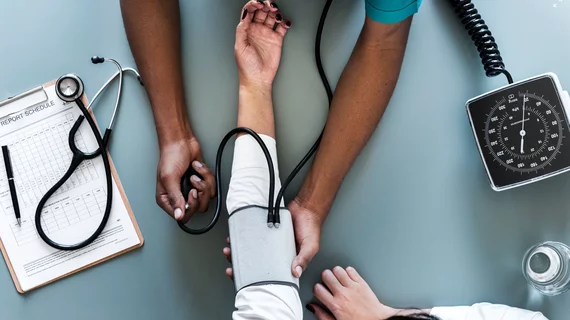Survey suggests healthcare workers need a refresher on BP measurement
Joint research from the American Heart Association and American Medical Association suggests that just half of practicing physicians and healthcare professionals have received blood pressure measurement training since they left school.
Nearly half of all adults in the U.S. have high blood pressure, making BP measurement a vital skill in a physician’s toolkit. BP guidelines recommend that all healthcare providers receive periodic re-training in BP measurement, but the AHA and AMA said it’s unknown whether that actually happens or re-training efforts fall to the wayside.
The groups surveyed more than 2,000 healthcare workers, asking them if they’d received any kind of BP measurement re-training since their initial training in professional school. Half of physicians and physician assistants, one-third of nurses and one-quarter of medical students reported that they hadn’t—but more than half the pool said a standard refresher should be required.
“Good blood pressure control is foundational for preventing heart disease and strokes,” Robert Harrington, president of the AHA, said in a statement. “An accurate BP measurement is important to help clinicians gauge treatment decisions and for patients to have confidence in their efforts to manage their health. That’s why both the AMA and AHA strongly support refresher training for healthcare professionals as a critical component to providing the highest quality of care and patient safety.”
The two organizations joined forces to develop “Achieving Accuracy: BP Measurement,” a $25 e-learning course born out of the groups’ larger Target: BP initiative. The module was designed in conjunction with Advocate Aurora Health in Illinois, the University of Pennsylvania, the University of Alabama at Birmingham and MinuteClinic, all of which are in the process of implementing a phased approach to BP measurement skills assessments and re-training their care teams.
“We found that the module is extremely useful for providers across all levels of training, from medical assistants through attending physicians,” Debbie Cohen, MD, a professor of medicine and the Director of Clinical Hypertension at UPenn, said in a statement. “We have no doubt that this will be a practice-changing endeavor.”
Her colleague, Jordana Cohen, MD, said the school has already started to develop a hypertension disease team and plans to integrate the BP training module into routine clinical practice.
The new CE/CME course is available both on the AHA’s e-learning platform and at TargetBP.org.

